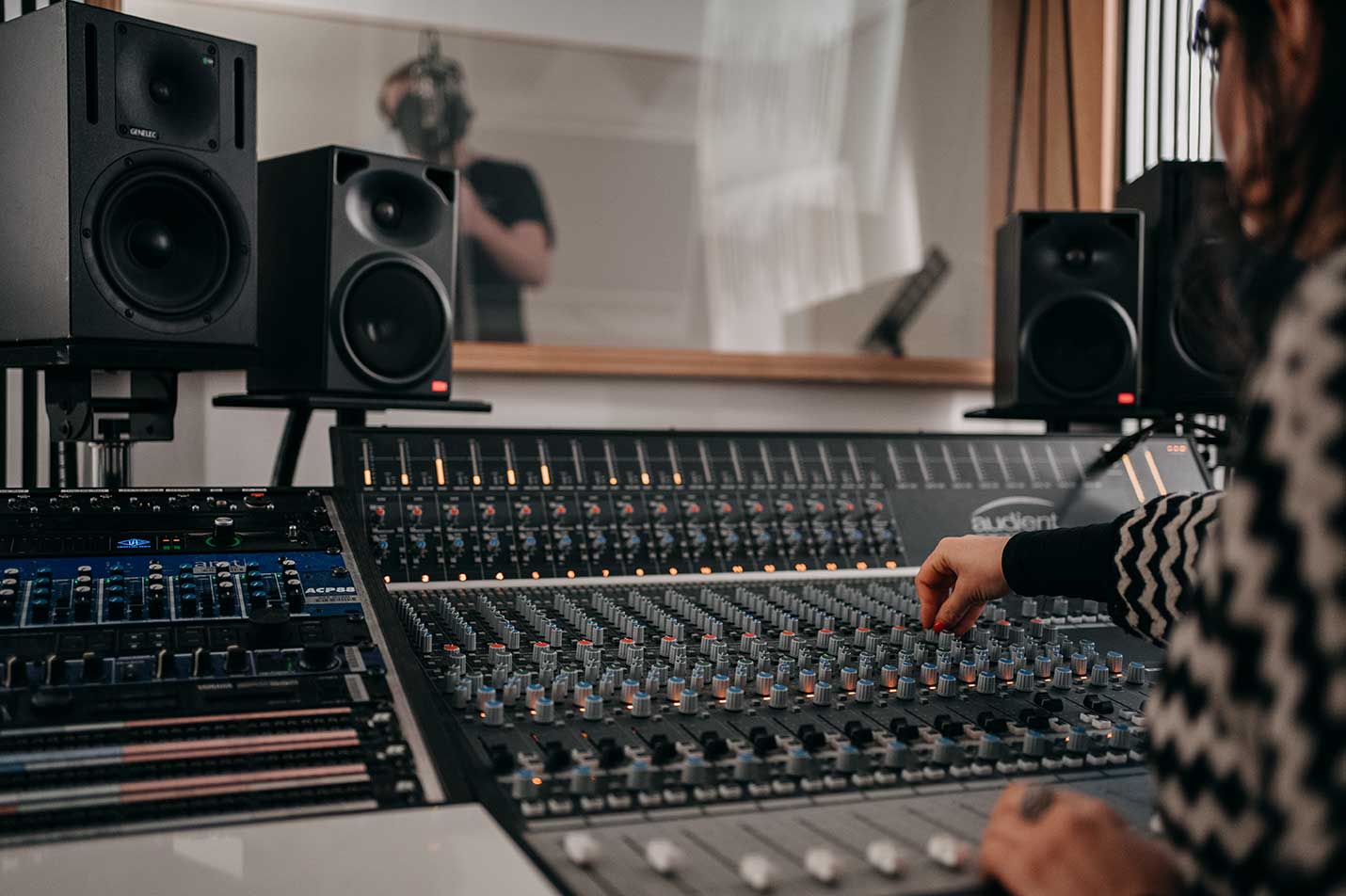Home>Production & Technology>Producer>How To Set Goals As A Music Producer


Producer
How To Set Goals As A Music Producer
Published: March 6, 2024
Learn how to set effective goals as a music producer to elevate your career and achieve success in the competitive music industry. Master the art of goal setting to excel as a producer.
(Many of the links in this article redirect to a specific reviewed product. Your purchase of these products through affiliate links helps to generate commission for AudioLover.com, at no extra cost. Learn more)
Table of Contents
- Introduction
- Understanding the Importance of Setting Goals
- Identifying Your Long-Term Vision
- Breaking Down Your Goals into Achievable Milestones
- Setting Specific, Measurable, Attainable, Relevant, and Time-Bound (SMART) Goals
- Creating a Plan of Action
- Staying Accountable and Adjusting Your Goals as Needed
- Conclusion
Introduction
As a music producer, setting goals is paramount to your success and growth in the industry. Whether you are a seasoned professional or just starting out, having a clear vision and actionable goals can be the catalyst for propelling your career forward. In this article, we will delve into the intricacies of setting effective and achievable goals as a music producer. From understanding the importance of goal-setting to creating a plan of action and staying accountable, we will explore the essential steps to help you navigate your journey as a music producer.
Setting goals is not merely a task to check off a list; it is a fundamental strategy that can shape your career trajectory and define your artistic evolution. By establishing clear objectives, you can channel your creativity and energy into meaningful pursuits, ultimately steering you towards tangible accomplishments. Whether your aspirations involve producing chart-topping tracks, collaborating with renowned artists, or mastering a specific genre, your goals serve as the roadmap to guide you through the dynamic and competitive music industry.
In the following sections, we will delve into the significance of setting goals, the process of identifying your long-term vision, breaking down your goals into achievable milestones, and implementing the SMART criteria to ensure that your objectives are specific, measurable, attainable, relevant, and time-bound. Furthermore, we will discuss the importance of creating a comprehensive plan of action, staying accountable, and adapting your goals as necessary to navigate the ever-evolving landscape of the music industry.
Embarking on a career as a music producer is an exhilarating journey filled with boundless opportunities and creative potential. By embracing the art of goal-setting, you can harness your passion for music and transform it into a purposeful and fulfilling career. So, let's embark on this insightful exploration of setting goals as a music producer, and equip ourselves with the tools to thrive in this vibrant and ever-evolving industry.
Understanding the Importance of Setting Goals
Setting goals as a music producer is not just a routine exercise; it is the cornerstone of your professional journey. It serves as a compass, guiding you through the complexities of the music industry and providing a clear direction for your creative pursuits. Here's why understanding the importance of setting goals is pivotal for your success:
-
Clarity and Focus: Establishing clear goals brings clarity to your artistic vision and helps you focus your efforts. Whether you aspire to produce a groundbreaking album, build a loyal fan base, or elevate your skills in a specific genre, defining your objectives sharpens your creative focus and fuels your passion for music production.
-
Motivation and Inspiration: Goals serve as powerful motivators, igniting the spark that propels you forward, even during challenging times. When you have a set of defined goals, each achievement, no matter how small, becomes a source of inspiration, fueling your drive to reach greater heights in your music career.
-
Measuring Progress: Setting goals enables you to track your progress and evaluate your achievements. It provides a tangible framework to measure how far you've come and how close you are to realizing your aspirations. This process of self-assessment fosters a sense of accomplishment and fuels your determination to continue pushing boundaries.
-
Strategic Decision-Making: With clear goals in place, you can make informed decisions that align with your long-term vision. Whether it involves choosing projects to work on, collaborations to pursue, or investments in your studio setup, your goals act as a strategic compass, guiding your choices and ensuring that they contribute to your overarching objectives.
-
Professional Development: Setting goals as a music producer is synonymous with investing in your professional growth. It prompts you to seek new learning opportunities, refine your skills, and explore innovative techniques, ultimately enhancing your capabilities and positioning you as a formidable force in the competitive music landscape.
In essence, understanding the importance of setting goals empowers you to navigate the intricate terrain of the music industry with purpose and determination. By embracing the transformative power of goal-setting, you can elevate your craft, expand your horizons, and carve a distinctive path towards a fulfilling and impactful career as a music producer.
Identifying Your Long-Term Vision
Identifying your long-term vision is the pivotal first step in setting goals as a music producer. It involves envisioning the ultimate destination of your music career and articulating the grand narrative that encapsulates your artistic aspirations. This process goes beyond short-term objectives and delves into the profound essence of your musical journey. Here's a comprehensive exploration of how to identify your long-term vision and the significance it holds in shaping your path as a music producer.
Embracing Creativity and Individuality
Your long-term vision is a reflection of your unique creative identity and the impact you aspire to make in the music industry. It encapsulates the essence of your artistic expression, the emotions you seek to evoke through your music, and the legacy you aim to leave behind. Whether it involves pioneering a new sub-genre, advocating for social change through your lyrics, or captivating audiences with groundbreaking production techniques, your long-term vision is a testament to your creativity and individuality.
Defining Milestones and Achievements
Identifying your long-term vision entails envisioning the milestones and achievements that will mark significant progress in your music career. It involves visualizing your debut album, headlining major music festivals, collaborating with influential artists, and earning prestigious accolades. By delineating these pivotal moments, you create a roadmap that outlines the transformative stages of your journey, instilling a sense of purpose and direction in your pursuit of excellence.
Nurturing Professional Growth and Evolution
Your long-term vision serves as a catalyst for your professional growth and artistic evolution. It encompasses the continual refinement of your production skills, the exploration of diverse musical styles, and the adaptation to ever-changing industry trends. It embodies your commitment to lifelong learning, innovation, and the relentless pursuit of excellence, ensuring that your music resonates with audiences across generations and stands the test of time.
Making a Meaningful Impact
Beyond personal achievements, your long-term vision encompasses the profound impact you aspire to make on listeners, fellow artists, and the music community as a whole. It involves fostering a sense of connection and emotional resonance through your music, advocating for positive change, and inspiring the next generation of music producers. By envisioning the transformative influence of your artistry, you infuse your long-term vision with purpose and significance, transcending mere career aspirations to embody a profound cultural legacy.
In essence, identifying your long-term vision as a music producer is an introspective and visionary process that shapes the very essence of your artistic odyssey. It empowers you to chart a course that is imbued with creativity, purpose, and the unwavering commitment to leave an indelible mark on the world through your music.
Breaking Down Your Goals into Achievable Milestones
Breaking down your overarching goals into achievable milestones is a strategic approach that transforms abstract aspirations into tangible, actionable steps. This process involves deconstructing your long-term vision into smaller, manageable objectives, each representing a significant progression in your music career. By delineating achievable milestones, you create a roadmap that not only clarifies the path to your ultimate goals but also instills a sense of accomplishment and momentum as you progress. Here's a comprehensive exploration of the significance and methodology of breaking down your goals into achievable milestones as a music producer.
Significance of Achievable Milestones
Breaking down your goals into achievable milestones offers several compelling benefits that are instrumental in propelling your music career forward:
-
Measurable Progress: By establishing achievable milestones, you create distinct checkpoints that allow you to measure your progress systematically. Each milestone represents a concrete achievement, providing a clear indication of how far you've advanced toward your overarching goals.
-
Motivation and Momentum: Achievable milestones serve as catalysts for motivation, infusing your journey with a sense of accomplishment and momentum. As you reach each milestone, you experience a surge of motivation, propelling you forward with renewed vigor and determination.
-
Course Correction: Achievable milestones enable you to assess your trajectory and make necessary adjustments. If you encounter challenges or unforeseen opportunities, these milestones act as pivot points, allowing you to recalibrate your approach while staying aligned with your long-term vision.
-
Focused Action: Deconstructing your goals into achievable milestones promotes focused action. Each milestone represents a specific target, guiding your efforts and resources toward attaining that particular objective, thereby streamlining your path to success.
Methodology of Establishing Achievable Milestones
The process of breaking down your goals into achievable milestones involves a systematic and strategic approach:
-
Clarity and Specificity: Begin by clearly defining your overarching goals, whether it's releasing a debut album, reaching a specific number of monthly listeners on streaming platforms, or securing a collaboration with a renowned artist. Once these goals are articulated, dissect them into smaller, specific milestones that align with your long-term vision.
-
Realistic and Time-Bound: Ensure that each milestone is realistic and time-bound. Setting unattainable milestones can lead to frustration, while vague timelines may dilute the sense of urgency. By establishing realistic and time-bound milestones, you create a sense of purpose and urgency, driving focused action.
-
Sequential Progression: Arrange your milestones in a sequential order that reflects a logical progression toward your overarching goals. Each milestone should build upon the achievements of the previous one, creating a cohesive and strategic trajectory for your music career.
-
Celebration and Reflection: As you reach each milestone, take the time to celebrate your achievements and reflect on the lessons learned. This practice not only reinforces your motivation but also provides valuable insights that can inform your approach to subsequent milestones.
In essence, breaking down your goals into achievable milestones is a transformative practice that imbues your music career with structure, momentum, and a clear path to success. By embracing this strategic approach, you empower yourself to navigate the complexities of the music industry with purpose, resilience, and a steadfast commitment to realizing your long-term vision.
Setting Specific, Measurable, Attainable, Relevant, and Time-Bound (SMART) Goals
Setting goals is an integral aspect of a music producer's journey, and employing the SMART criteria is a powerful framework for crafting objectives that are precise, quantifiable, achievable, relevant, and time-bound. By adhering to the SMART principles, music producers can elevate their goal-setting process, ensuring that their aspirations are not merely abstract desires but actionable and strategic pursuits. Here's a detailed exploration of each component of SMART goals and its significance in the context of music production:
Specific
Specificity in goal-setting entails articulating precise and well-defined objectives that leave no room for ambiguity. For music producers, specific goals could revolve around areas such as releasing a certain number of tracks within a defined timeframe, mastering a new production technique, or securing a collaboration with a particular artist. By honing in on specific targets, producers can channel their efforts and resources with laser-sharp focus, maximizing their productivity and impact.
Measurable
Measurability is crucial for evaluating progress and determining the attainment of goals. Music producers can imbue their objectives with measurability by quantifying them in tangible terms. This could involve setting targets for the number of streams or downloads a track aims to achieve, defining specific metrics for audience engagement, or establishing quantifiable benchmarks for skill enhancement. Measurable goals provide producers with a clear yardstick for assessing their advancements and refining their strategies.
Attainable
Attainability centers on setting goals that are challenging yet within the realm of feasibility. Aspiring to stretch one's capabilities and reach new heights is commendable, but goals must also be rooted in practicality. Music producers can ensure the attainability of their objectives by conducting a realistic assessment of their resources, skills, and industry dynamics. This approach fosters a balance between ambition and achievability, empowering producers to pursue goals that inspire growth without being unattainable fantasies.
Relevant
Relevance underscores the alignment of goals with the overarching vision and mission of a music producer. Every goal should contribute meaningfully to the producer's artistic evolution, career advancement, or creative impact. Whether it involves diversifying one's musical repertoire, expanding into new markets, or leveraging technology for innovative production, relevant goals resonate with the producer's aspirations and the evolving landscape of the music industry.
Time-Bound
Time-bound goals are anchored in a clear timeframe, instilling a sense of urgency and purpose. Music producers can imbue their objectives with time-bound parameters by setting specific deadlines or milestones for their attainment. This temporal dimension injects a sense of accountability and impetus into the goal-setting process, propelling producers to take decisive action and make tangible strides within defined timeframes.
In essence, embracing the SMART criteria empowers music producers to infuse their goal-setting endeavors with precision, accountability, and strategic intent. By crafting goals that are specific, measurable, attainable, relevant, and time-bound, producers can navigate their creative odyssey with clarity, purpose, and the unwavering commitment to realize their artistic aspirations.
Creating a Plan of Action
Crafting a comprehensive plan of action is a pivotal phase in the journey of a music producer. It involves translating overarching goals and aspirations into a strategic roadmap, delineating the specific steps, resources, and timelines required to bring these objectives to fruition. A well-crafted plan of action serves as a guiding beacon, offering clarity, structure, and a systematic approach to navigating the multifaceted terrain of the music industry.
Defining Clear Objectives and Priorities
The initial step in creating a plan of action is to define clear objectives and prioritize them based on their significance and interdependence. Whether it involves releasing a new album, expanding one's fan base, or honing specific production skills, each objective should be meticulously articulated, ensuring that it aligns harmoniously with the long-term vision of the music producer. By establishing clear priorities, producers can channel their efforts and resources effectively, optimizing their impact and progress.
Identifying Key Strategies and Resources
Once the objectives are delineated, the next phase entails identifying the key strategies and resources essential for their realization. This involves evaluating the tools, technologies, and industry connections required for successful goal attainment. Whether it entails leveraging social media for audience engagement, investing in state-of-the-art production equipment, or forging strategic partnerships with other artists or industry professionals, identifying the requisite strategies and resources is pivotal for a robust plan of action.
Establishing Milestones and Timelines
A well-crafted plan of action integrates achievable milestones and timelines that serve as navigational markers throughout the journey. By breaking down the overarching objectives into smaller, manageable milestones, music producers can track their progress and make necessary adjustments. Furthermore, establishing clear timelines for each milestone instills a sense of urgency and accountability, propelling producers toward consistent and measurable advancements.
Adapting to Industry Dynamics and Feedback
Flexibility and adaptability are integral components of an effective plan of action. The dynamic nature of the music industry necessitates the ability to respond to evolving trends, audience preferences, and industry feedback. As such, a robust plan of action should incorporate mechanisms for gathering feedback, monitoring industry dynamics, and adapting strategies and timelines accordingly. This iterative approach empowers music producers to remain agile and responsive, ensuring that their plan of action remains relevant and effective in a rapidly changing landscape.
In essence, creating a plan of action is a transformative process that empowers music producers to translate their artistic aspirations into tangible realities. By defining clear objectives, identifying strategic approaches, establishing milestones, and embracing adaptability, producers can chart a purposeful and resilient course toward the realization of their musical ambitions.
Staying Accountable and Adjusting Your Goals as Needed
Staying accountable and adaptable is a fundamental aspect of the journey for music producers. It involves fostering a culture of responsibility, self-assessment, and flexibility to ensure that goals remain aligned with the evolving dynamics of the music industry. Here's a comprehensive exploration of the significance and methodology of staying accountable and adjusting goals as needed in the realm of music production.
Embracing Accountability
Accountability serves as a cornerstone for the realization of goals, prompting music producers to take ownership of their commitments and actions. By holding themselves accountable, producers cultivate a mindset of integrity and diligence, ensuring that they honor their obligations to themselves, their collaborators, and their audience. This culture of accountability fosters a sense of discipline and reliability, propelling producers to consistently strive for excellence and progress in their music careers.
Regular Progress Evaluation
Staying accountable involves regular evaluation of progress against the established milestones and objectives. Music producers can leverage various tools and metrics to assess their advancements, such as tracking audience engagement, monitoring streaming statistics, and soliciting feedback from industry peers. This diligent evaluation provides valuable insights into the efficacy of existing strategies, enabling producers to identify areas for improvement and recalibrate their approaches as needed.
Adaptability and Flexibility
The dynamic nature of the music industry necessitates a spirit of adaptability and flexibility in goal pursuit. As trends evolve, audience preferences shift, and new opportunities emerge, music producers must be prepared to adjust their goals to remain relevant and responsive. This adaptability entails a willingness to embrace change, pivot strategies, and explore new creative avenues, ensuring that goals remain attuned to the ever-changing landscape of the music industry.
Openness to Feedback
Staying accountable involves fostering an environment of openness to feedback and constructive criticism. Music producers can benefit immensely from seeking input from industry peers, collaborators, and their audience. Constructive feedback serves as a valuable compass, guiding producers in refining their goals, enhancing their creative output, and addressing any shortcomings. By embracing feedback, producers demonstrate a commitment to continuous improvement and a deep regard for the perspectives of those engaged with their music.
Iterative Goal Refinement
The process of staying accountable and adaptable culminates in the iterative refinement of goals. As music producers navigate their careers, they may encounter unforeseen challenges, unanticipated opportunities, and shifts in their artistic vision. Consequently, the ability to adjust and refine goals in response to these dynamics is paramount. This iterative refinement process ensures that goals remain aligned with the producer's evolving aspirations, industry trends, and the ever-unfolding narrative of their artistic journey.
In essence, staying accountable and adjusting goals as needed is an ongoing and transformative practice that empowers music producers to navigate the intricate terrain of the music industry with resilience, adaptability, and an unwavering commitment to realizing their artistic aspirations.
Conclusion
In the dynamic and competitive landscape of music production, the art of setting goals is not merely a routine exercise but a transformative strategy that shapes the trajectory of a producer's career. As we conclude this insightful exploration of setting goals as a music producer, it becomes evident that the process transcends mere aspirations and delves into the realm of purposeful and strategic pursuit.
By understanding the importance of setting goals, music producers equip themselves with a compass that provides clarity, motivation, and the ability to measure their progress. This foundational understanding serves as the bedrock upon which the edifice of a successful music career is built.
Identifying a long-term vision emerges as a profound introspective journey, wherein producers articulate their creative identity, envision transformative milestones, and commit to leaving an indelible mark on the music industry. This visionary process infuses their artistic odyssey with purpose, individuality, and a steadfast commitment to making a meaningful impact through their music.
Breaking down overarching goals into achievable milestones represents a strategic approach that empowers producers to track their progress, celebrate achievements, and make necessary adjustments. This practice imbues their music career with structure, momentum, and a clear path to success, ensuring that each milestone becomes a stepping stone toward their ultimate aspirations.
Embracing the SMART criteria elevates goal-setting to a precision-driven and strategic endeavor, infusing producers' aspirations with clarity, accountability, and a sense of purpose. Crafting specific, measurable, attainable, relevant, and time-bound goals empowers producers to navigate their creative odyssey with precision, resilience, and an unwavering commitment to realizing their artistic aspirations.
Creating a comprehensive plan of action serves as a guiding beacon, offering clarity, structure, and a systematic approach to navigating the multifaceted terrain of the music industry. This strategic roadmap delineates the specific steps, resources, and timelines required to bring producers' objectives to fruition, ensuring that their aspirations are not merely abstract desires but actionable and strategic pursuits.
Staying accountable and adaptable emerges as a fundamental practice that empowers music producers to navigate the intricate terrain of the music industry with resilience, adaptability, and an unwavering commitment to realizing their artistic aspirations. By fostering a culture of responsibility, self-assessment, and flexibility, producers ensure that their goals remain aligned with the evolving dynamics of the music industry.
In essence, the journey of setting goals as a music producer is a transformative odyssey that empowers individuals to channel their creative energy, navigate industry complexities, and carve a purposeful and impactful path in the world of music production. By embracing the art of goal-setting, music producers embark on a journey that transcends aspirations and transforms them into tangible and enduring accomplishments, ensuring that their artistic legacy resonates with audiences and reverberates through the annals of music history.











